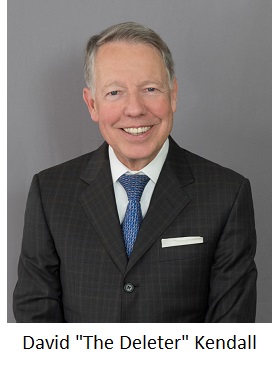 Arkansas Bar prosecutors dismissed a misconduct complaint against Hillary Clinton this week, claiming “there does not appear to be a sufficient basis for a formal complaint” despite Congressional referrals to the Justice Department for perjury and obstruction of justice.
Arkansas Bar prosecutors dismissed a misconduct complaint against Hillary Clinton this week, claiming “there does not appear to be a sufficient basis for a formal complaint” despite Congressional referrals to the Justice Department for perjury and obstruction of justice.
Michael Harmon, the deputy director of the Arkansas Supreme Court’s Office of Professional Conduct, suggested in a July 24, 2017 letter to me that the grievance was dismissed at least in part because the Justice Department ultimately did not file criminal charges against Mrs. Clinton. He also cited the fact that “grievances filed by you with other disciplinary agencies were dismissed against attorneys who were involved in certain aspects of the conduct of which you complain,” and he noted that I have 20 days to file an appeal (consider it done).
Mr. Harmon was referring to the grievances that I filed in D.C. and Maryland against David Kendall, Cheryl Mills, and Heather Samuelson, the three attorneys who destroyed thousands of emails while representing Mrs. Clinton. My regular readers will recall that Elizabeth Herman, an Obama donor and the chief deputy prosecutor at the D.C. Bar, dismissed my complaints without an investigation, then the D.C. Court of Appeals covered up the cover up.
 The Maryland Bar similarly dismissed grievances against Mr. Kendall, Ms. Mills, and Ms. Samuelson without an investigation, so I filed a petition for mandamus in the Anne Arundel County Circuit Court. An assistant to Maryland Attorney General Brian Frosh, an ardent Hillary supporter, asked the court to seal the case from public view, and the request was granted a few weeks ago over my opposition. That smells like a cover up, and I suspect it means my petition will be denied, in which case I can (and will) take the issue up with the Maryland Court of Appeals.
The Maryland Bar similarly dismissed grievances against Mr. Kendall, Ms. Mills, and Ms. Samuelson without an investigation, so I filed a petition for mandamus in the Anne Arundel County Circuit Court. An assistant to Maryland Attorney General Brian Frosh, an ardent Hillary supporter, asked the court to seal the case from public view, and the request was granted a few weeks ago over my opposition. That smells like a cover up, and I suspect it means my petition will be denied, in which case I can (and will) take the issue up with the Maryland Court of Appeals.
The rationale of the Arkansas Office of Professional Conduct is easy enough to understand: “Everyone else is covering this up, so why shouldn’t we?” Perhaps because the law does not give Arkansas bar prosecutors the discretion to dismiss the complaint. As I explained in an October 17, 2016 letter to Executive Director Stark Ligon, the relevant rules are mandatory:
Upon a determination by the Executive Director that a complaint sets out allegations falling within the purview of the Committee and that those allegations are supported by sufficient evidence, the Executive Director shall provide any assistance needed in the preparation of the complainant’s affidavit and shall process a formal complaint pursuant to these Procedures.
Procedures of the Arkansas Supreme Court Regulating Professional Conduct of Attorneys at Law § 5(C)(3).
As I noted in my original grievance against Mrs. Clinton, there was no question at that time that she gave false  testimony to Congress regarding what happened to her missing emails. The only issue for criminal prosecutors was whether she willfully gave false testimony, which is the required standard for a perjury conviction.
testimony to Congress regarding what happened to her missing emails. The only issue for criminal prosecutors was whether she willfully gave false testimony, which is the required standard for a perjury conviction.
The standard for professional discipline, however, is different from the standard for a criminal conviction. Whereas a criminal prosecutor would have to prove beyond a reasonable doubt that Mrs. Clinton willfully lied to Congress, a bar prosecutor need only prove based on a preponderance of the evidence (i.e., more likely than not) that Mrs. Clinton recklessly gave false testimony to Congress. Thus professional discipline could be imposed even if criminal prosecutors concluded that there was not enough evidence to file charges. And that doesn’t even reach the issue of whether Mrs. Clinton assented to the destruction of evidence by Mr. Kendall, Ms. Mills, and Ms. Samuelson.
Here’s an excerpt from my March 20, 2017 blog post:
If a peon lawyer like me had been accused of lying under oath, destroying evidence, and obstructing justice, bar prosecutors would have immediately sent a letter demanding that I respond to the charges in detail. If I was unable to provide a satisfactory explanation, the bar would file charges against me. But of course, Mrs. Clinton is not a peon lawyer like me.
As I’ve said from the outset, my bar grievances against Mrs. Clinton and her lawyers have little to do with Mrs. Clinton and her lawyers and a lot to do with illustrating the rampant politicization and corruption among the various grievance committees and state bar prosecutors. If you’re a lawyer with political connections, you can get away with almost anything, and Mrs. Clinton and her lawyers are helping prove my point.
I predicted from the outset that my grievance would be dismissed for political reasons (read the bottom of my September 6, 2016 post and you’ll see that I have some history with the Arkansas Bar, even though I’m not a member), so none of this comes as a surprise. In fairness to Mrs. Clinton and her lawyers, I should note that the corruption and hypocrisy cuts across party lines. Just look at the case of Texas Attorney General Ken Paxton, a corrupt Republican who has been protected by Texas bar prosecutors.
Regardless, nobody should be above the law, whether Republican or Democrat, Presidential candidate or peon. In the real world, however, we have a ruling class that wants its members protected at all costs.
FUN AND GAMES WITH THE CALIFORNIA BAR
In the latter part of my June 21, 2017 blog post, I explained how California bar prosecutors started an investigation (and ultimately filed charges against me) after I blogged about corruption within the California Bar. I filed a federal civil rights lawsuit against the bar alleging retaliation and selective prosecution, and last week U.S. District Judge William H. Alsup sanctioned the California Bar for deceiving him at an earlier hearing.
 Judge Alsup had some blistering comments for Suzanne Grandt, the attorney representing the bar, even suggesting that he might refer her to the federal court’s grievance committee (oh, the irony). The California Bar was none too pleased with the outcome, and the Los Angeles Daily Record ran a front-page story on Friday about the sanction. “I don’t believe you’ll get a fair hearing in the State Bar court,” the judge told me. “I think the way this thing has been presented to me, that they’re going to shortchange you.”
Judge Alsup had some blistering comments for Suzanne Grandt, the attorney representing the bar, even suggesting that he might refer her to the federal court’s grievance committee (oh, the irony). The California Bar was none too pleased with the outcome, and the Los Angeles Daily Record ran a front-page story on Friday about the sanction. “I don’t believe you’ll get a fair hearing in the State Bar court,” the judge told me. “I think the way this thing has been presented to me, that they’re going to shortchange you.”
I agree, and I wish he had granted my request for an injunction against the bar prosecutors. Nonetheless, I’m thankful that he ordered Gregory Dresser, the former interim chief bar counsel, to submit to a two-hour deposition. You can read the entire hearing transcript by clicking here. Stay tuned.
07/26/2017